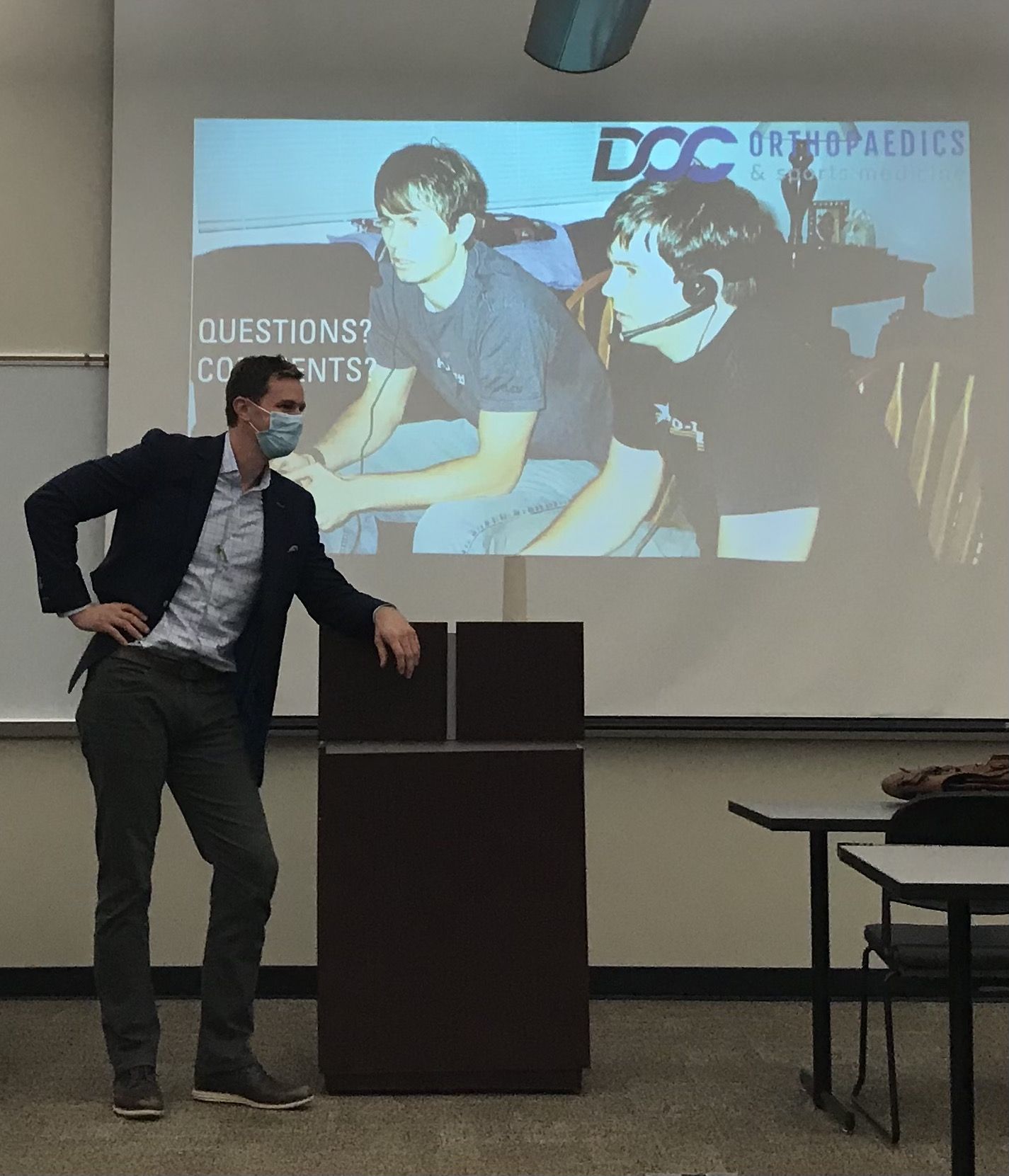
Gaming Injuries
Esports Injuries
When you hear the phrase “sports injuries,” you may immediately think of football, basketball and baseball injuries players sustain while competing or training. These injuries impact professionals to weekend warriors.
You may not include esports injuries in your list of ones to be aware of, but you should. People who regularly participate in esports – also known as video gamers – are prone to their own unique injuries and ailments. These gaming injuries can plague patients causing long-term problems. Playing in the virtual world can lead to real world injuries.
With gamers, it’s not the game they play that impacts their health so much as the way they play. Simple things like posture and positioning can contribute to headaches, back aches, tendon pain, and carpal tunnel syndrome. Some injuries can persist for long periods of time impacting other areas of life.
Dr. Justin Daigre with DOC Orthopaedics and Sports Medicine, recently spoke to the Calhoun esports team and shared helpful information on prevention and treatment for gaming injuries.
Prevalent issues include:
Postural syndromes are caused by a muscle imbalances where some muscles contract longer than others ultimately causing pain and disability.
Specific types include:
Upper crossed syndrome which impacts your upper back and neck, causing tight shoulders and burning pain.
Lower crossed syndrome affects your hip and low back and is caused by prolonged sitting in an improper position.
Tension type headaches can be caused by poor posture and overuse of neck muscles.
Repetitive strain injuries can result from repeating the same motion over extended periods of time.
Specific types include:
Mouse elbow, mostly seen in PC gamers, affects the muscles of the elbow and can be a source of chronic elbow pain.
Gamer’s thumb, mostly seen with console gamers, is pain at base of thumb that often comes with a burning sensation when gripping.
Mouse shoulder, caused when your shoulder is extended for long periods, can cause tendon fiber disruption and shoulder pain. This is mainly seen in patients that use a computer mouse.
Nerve impingements, also known as a pinched nerves, occurs when too much pressure is applied to a nerve by its surrounding tissues such as bone, tendon, cartilage, or muscles.
Common examples include:
Carpal tunnel syndrome causes numbness in the thumb, index and middle fingers. It can be seen in all gamers, both PC and console users.
Cubital tunnel syndrome causes numbness in the ring and small fingers. It is usually caused by leaning the elbows on knees or chair armrests and is seen mainly in console gamers.
Ways to avoid injury
You can reduce your risk of injury from esports by making sure you’re playing in a comfortable position that doesn’t pinch, twist, or cramp your body. You should also be mindful of the placement of your monitor.
Here are a few specific tips:
Consider investing in a chair specially designed for gaming, especially if you’re likely to play for long periods in a single sitting.
Use a headrest to reduce pressure on your neck. Keep your head back and your chin tucked to avoid neck pain and tension headaches.
Pull your shoulder blades down and back, resting your upper back on your chair to avoid shrugging or rounding your shoulders.
Keep your low back pressed against the chair to avoid slouching.
Keep the chair upright or slightly reclined to reduce pressure on the discs in your back.
Avoid sitting with your legs crossed, since the shift in balance may create pressure on your nerves.
The gaming monitor should be at least 20 inches from your face, with the top third of the monitor level with your eyes and tilted slightly upward.
Use your arm rests, positioned high enough to rest your elbows at 90-degree angles. Avoid too much pressure on your forearms, which could lead to cubital tunnel syndrome, or too little support, which could cause mouse shoulder.
In addition to taking these steps while you’re playing, it’s also important to get up and move between games or matches. Utilize stretches and eye relief exercises to prevent injury and ensure a long playing session without fatigue.
How to treat injuries
If you think you may already be suffering from the effects of long-term gaming, it’s important for you to visit an orthopaedic specialist for guidance. Depending on the severity of your condition, your doctor may recommend a course of treatment ranging from physical therapy to injections. Working with a specialized practice like DOC Orthopaedics and Sports Medicine in Decatur, you can take advantage of the expertise of its ten providers as part of its multidisciplinary musculoskeletal practice.
Since 1972, DOC Orthopaedics and Sports Medicine has been committed to providing exceptional orthopaedic care through innovative techniques, quality services, patient communication and education. With specialties ranging from general orthopaedics and physical therapy to sports medicine, joint replacement and more, the doctors at DOC Orthopaedics and Sports Medicine can provide local expert care for any orthopaedic disorder or injury and help put your life back in motion.

